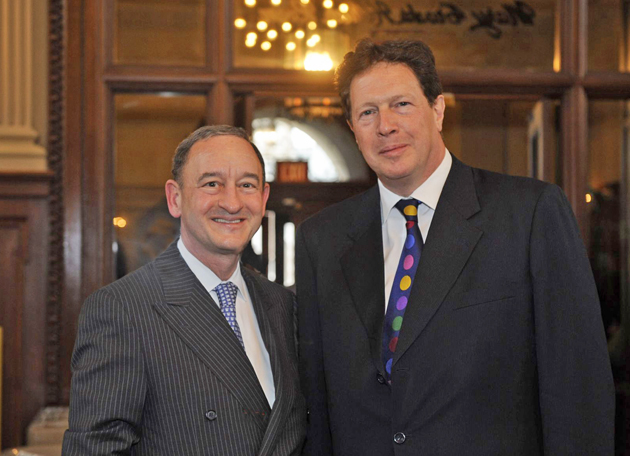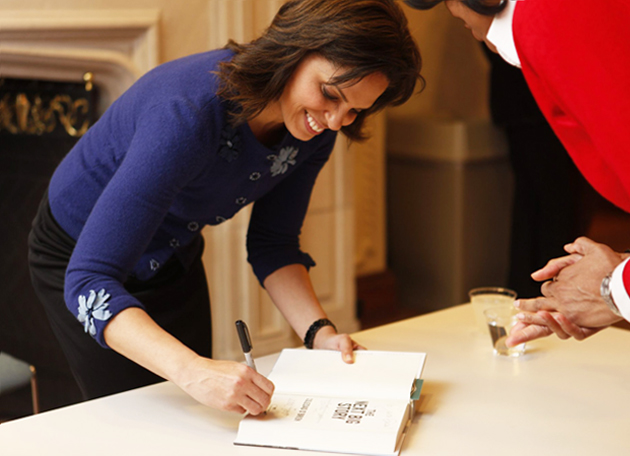
In 1933 and again in 1953, poet T.S. Eliot returned to his native St. Louis and spoke at Washington University, a place filled with personal and family memories. His grandfather, William Greenleaf Eliot, was the university’s co-founder, and Eliot himself had graduated from its secondary division, Smith Academy, in 1905. But he was also a devoted British citizen, who once declared: “My mind may be American but my heart is British.”
Thus, it was particularly appropriate that this year’s speaker for the annual T.S. Eliot Lecture was Sir Nigel Sheinwald, British ambassador to the United States, whose speech on March 4, 2011, was titled: “Britain and America: An Easy Commerce of the Old and New.” In citing “easy commerce,” he was quoting Eliot, who had used that line in Little Gidding, the final poem in his Four Quartets.
“If you look at any aspect of our relationship, whether it’s economic or national security or working together on energy or against terrorism, there is still a huge degree of collaboration, openness and candor in the relationship,” says Sir Sheinwald, about the ongoing relations between the United Kingdom and the United States.
Standing before a portrait of W.G. Eliot in Holmes Lounge, Sheinwald spoke to an appreciative crowd — among them many attentive students — about the relationship between the United States and the United Kingdom, “deeply rooted in shared history and values, but also oriented to the future at least as much as to the past.” Today, the two countries are still closely intertwined in many ways, he said.
“If you look at any aspect of our relationship, whether it’s economic or national security or working together on energy or against terrorism, there is still a huge degree of collaboration, openness and candor in the relationship,” he said after the lecture. “Even if you’re the world’s only superpower — as the U.S. is — you need to check your bearings with other countries, share strategies, build coalitions, work out how you are going to get things done in the U.N. The U.K tends to be the main sounding board and partner for the U.S. in those circumstances.”
Sir Sheinwald is not the only example of a prominent visitor speaking on campus. Through the years, Washington University has played host to a glittering array of political figures: U.S. presidents (George H.W. Bush, 1989, 1992; George W. Bush, 2004), a future president (Bill Clinton, 1992), vice presidents (Hubert Humphrey, 1965; Al Gore, 2000), and a future vice president (Joseph Biden, 2008). First ladies (Eleanor Roosevelt, 1954, 1957; Rosalynn Carter, 1985, 2011; Hillary Rodham Clinton, 1994) have also stopped by.
As part of the Assembly Series lectures, Commencement ceremonies, Eliot Honors gatherings, lectures at all the schools and presidential debates, the university has entertained other important guests as well. Among that illustrious crowd are at least 11 Supreme Court justices, including Felix Frankfurter (1952), Earl Warren (1955, 1972), Harry Blackmun (1977, 1978), William J. Brennan Jr. (1989), Sandra Day O’Connor (1990, 1997) and Ruth Bader Ginsburg (1978, 2001).
And these lectures have highlighted important pieces of our nation’s history, such as the civil rights era, with such speakers as Charles Evers (1969), Ralph Abernathy (1970), Quincy Troupe (1970, 1971), Jesse Jackson (1972, 1991), Stokely Carmichael (1974), Louis Farrakhan (1976), Coretta Scott King (1982), Eldridge Cleaver (1995) and Julian Bond (2001, 2011). Other speeches have covered such critical topics as the history of science, with Francis Crick (1980) and James Watson (1997).
One well-represented category is journalism, with a range of popular television and print journalists through the years. Among them are Ted Koppel (1986), Bill Moyers (1986), Ellen Goodman (1987), Katha Pollitt (1995), Tom Friedman (2003, 2004) and Calvin Trillin (2008). An April 2011 visitor to campus for the annual Martin Luther King Jr. Memorial Lecture was Soledad O’Brien, CNN anchor, special correspondent and host of its documentary unit, “In America.”
“When people ask whether we are a post-racial society, half the room will nod their heads and the other half will shake their heads ‘no,’” says Soledad O’Brien, CNN reporter. “So, clearly, we are not in agreement, and I think it’s worth examining for students who are about to be launched into their careers.”
O’Brien’s speech examined the role that race plays in America today and how that has changed over time. As she does in her documentaries, which have featured such minorities as Latino-Americans and Muslim-Americans, she focused on what it means to be an American whose voice is often not heard. It’s important to raise such issues with college students, she said, because they need to think about how they will live their adult lives.
“What will the role of diversity be for them?” she asked before her speech. “When people ask whether we are a post-racial society, half the room will nod their heads and the other half will shake their heads ‘no.’ So, clearly, we are not in agreement, and I think it’s worth examining for students who are about to be launched into their careers.”
O’Brien and her husband, an investment banker, both went to Harvard University. For their four children — daughters, 10 and 9; twin sons, 6 — going to college isn’t a special topic at the dinner table. Rather, she said, it is a tacit assumption. Because she would like this to be true for more children, she and her husband have established a foundation to help young women get through college.
“For a lot of these women, college was never discussed in their homes,” she says. “It would be like, for you and me, if somebody said: ‘Do you want to climb Mt. Kilimanjaro?’ You’d say: ‘I’m not sure that’s doable.’ I think we need to tell young people that this is an expectation. It’s going to be a challenge, it’s going to be hard; and yet they can succeed.”
Sir Nigel Sheinwald, an Oxford University graduate, touched on higher education in his lecture, too, pointing out that fully half of the world’s top 30 universities are in the United States or the United Kingdom. Together, higher education and research determine a nation’s ability to compete in the global marketplace. So it is surely no coincidence, he added, that the U.S. and U.K. have won half of all Nobel prizes ever awarded, including eight of nine last year.
In the future, he would like to see broad, new academic links develop that build on traditional ties between U.K. and U.S. schools, like Washington University. “If you also link up with a university in China, India or the Persian Gulf, you create a new type of research collaboration,” he says. “We are seeing a few of those develop now, and that is one of the big ambitions of our government: to encourage that sort of trilateral or even more complex academic collaboration.”
Candace O’Connor is an award-winning freelance writer based in St. Louis.
For more information on the aforementioned talks or on different lecture series at the university, visit the following websites: Assembly Series; ‘Commerce of the Old and New’; ‘British Ambassador to United States will deliver major policy address at WUSTL’; Public Interest Law and Policy Speakers; Tyrrell Williams Lecture Series; Arts & Sciences Upcoming Lectures; Sam Fox School Lectures; Mildred Lane Kemper Art Museum Lectures.

Comments and respectful dialogue are encouraged, but content will be moderated. Please, no personal attacks, obscenity or profanity, selling of commercial products, or endorsements of political candidates or positions. We reserve the right to remove any inappropriate comments. We also cannot address individual medical concerns or provide medical advice in this forum.